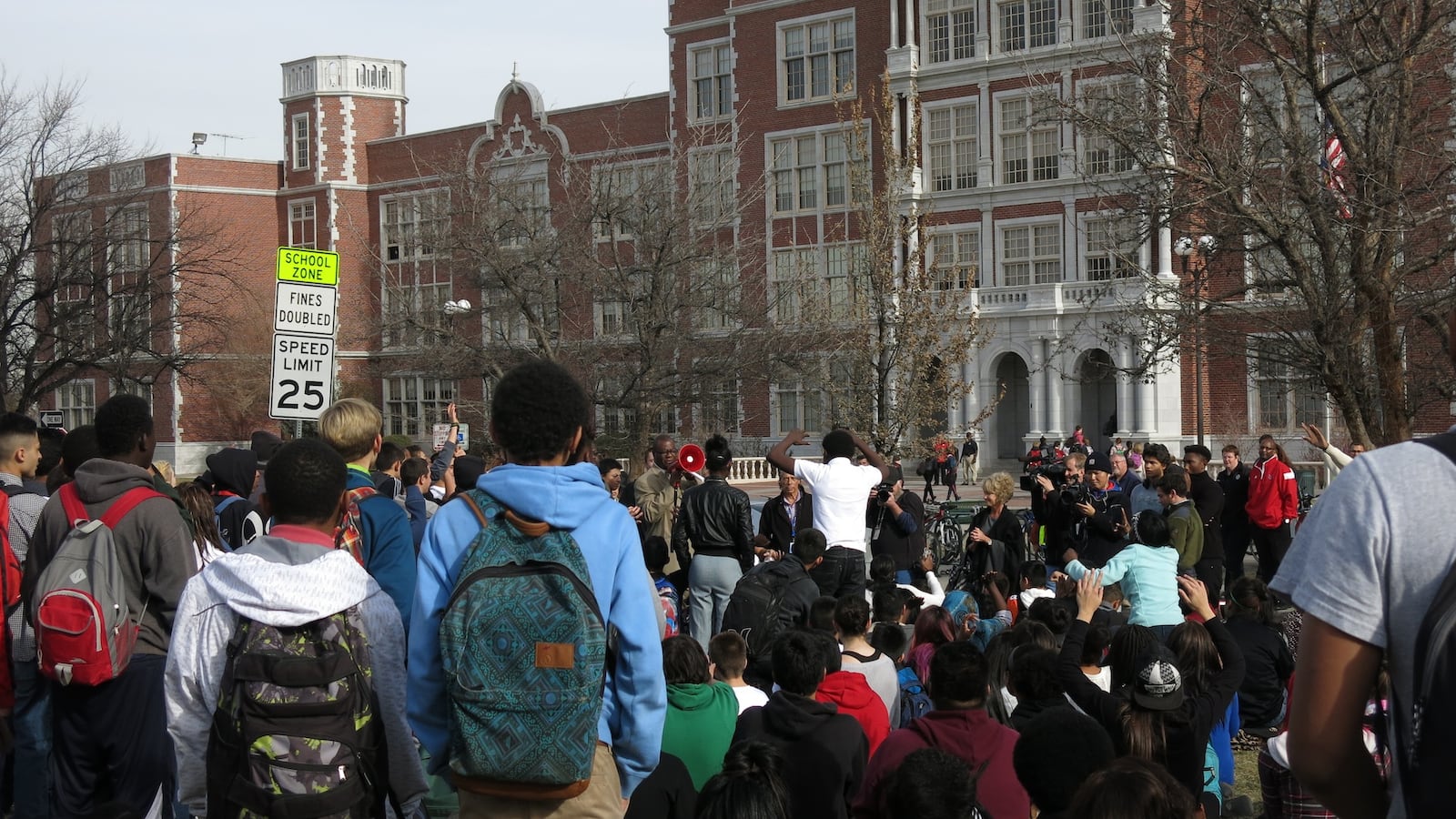In Denver, some students were told they’d face severe consequences if they walked out of school last fall.
In Boulder, students received donuts from school board members while they protested against standardized tests.
In tiny Mancos, student activists took to social media because they knew a protest in the streets wouldn’t make much of a splash.
These were just some of the details shared by the eight high school student activists who spoke at Rising Up: Voices from Colorado’s Emerging Student Protest Movement, an event held by Chalkbeat at the University of Colorado Denver last week. The students had different experiences, but shared a concern about how rarely students’ opinions are considered by policymakers.After each protest, critical voices across the state raised questions about whether students were choosing the safest or most effective way to make their points. Some wondered if the high schoolers were taking their cues from adults, and if participants were more focused on missing class than on the issues at hand.
This event was a chance to hear directly from students in four districts about how they organized, why, and what comes next. We also invited a few adults with expertise in the subject matter to talk about how the protests were received and how they fit into a broader social and historical context. (For more student perspectives on activism, check out these interviews; for a glimpse at the social media conversation prompted by the event, check out this post.)
Below, we’ve pulled out some highlights and audio clips from the Rising Up event. You can also listen to a recording of the full event below.
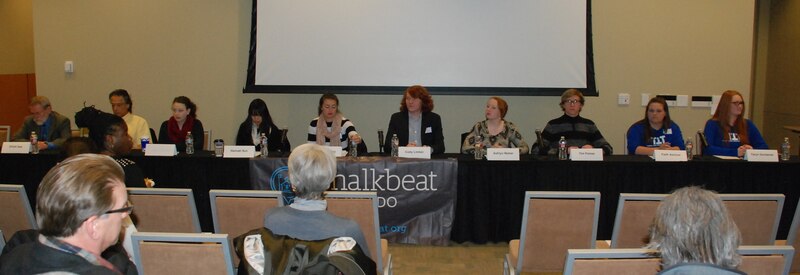
More diplomatic methods didn’t work
Several students said that more traditional methods of voicing dissent, such as letter-writing, were either unsuccessful or suggested too late in the game. Boulder student Rachel Perley said administrators suggested writing letters and provided students with lists of legislators and other policymakers to contact, but only after students proposed a walk-out.
Jefferson County student Ashlyn Maher talked about how Jeffco parents and teachers tried conventional methods to no avail.
Organizing on social media
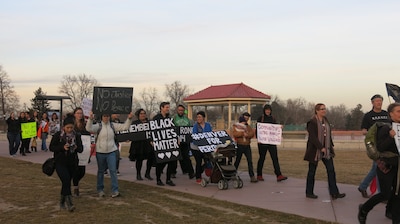
Students in all four districts used social media to launch their campaigns. In Boulder, Fairview High School’s senior class Facebook page was a launchpad for the resistance.
“About three weeks before the test actually happened was when we got our schedule for it,” Rachel Perley said. “That day that the schedule came out, that Facebook page blew up. Everybody was like, ‘Why are we taking this? Let’s refuse. Let’s walk out.’ It kind of went crazy.”
In Mancos, social media is where students started their “Terminate Trivial Testing” campaign. Mancos student Taryn Gordanier said that it made more sense to students in the small rural district to spread the word online.
Inspiring peers around the state and nation
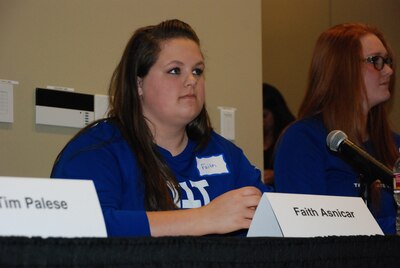
In their role as the first Colorado district to try mass student protests last fall, Jeffco students served as an inspiration to high schoolers in other parts of the state.
Mancos student Faith Asnicar said, “These big schools up in Denver had been doing these protests and doing these walkouts and…that’s what kind of helped us realize, well, they’re doing it, so why can’t we do it?”
Hannah Sun, a Denver School of the Arts student, discussed the connections she saw between the districts.
Protests in Denver seen through different lens
Several panelists talked about how Denver students who protested the Ferguson grand jury decision were viewed differently than their suburban counterparts.
Bill de la Cruz, the director of equity and inclusion for Denver Public Schools, said, “It’s interesting that Boulder board members brought donuts…In Denver, it was the extreme from ‘Those kids are horrible. They should be in class,’ to ‘We’re really proud of them.’”
Ben Kirshner, an associate professor at the University of Colorado Boulder, shared his observations and questions about this reaction.
Discomfort with conversations about race in Denver
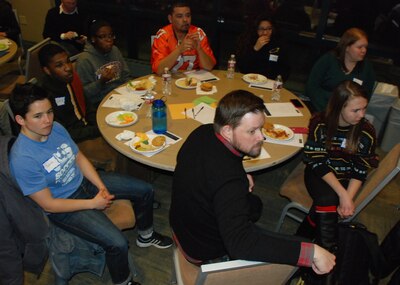
Multiple panelists talked about how there is a consistent discomfort with having conversations about race in many Denver schools. Estee Dechtman, a freshman at Denver School of the Arts, said that before the Ferguson walk-outs there was no structured class time to broach racial inequity and social justice issues.
De la Cruz said that the students’ walk-outs had raised awareness and led to some concrete changes: “I have to applaud these students because after they did all these walk-outs all these conversations weren’t happening and now they’re happening and they continue to happen as well.”
Testing protests a wake-up call for state policy-makers
Elliott Asp, special assistant to the commissioner at the Colorado Department of Education, said the anti-testing protests made staff at the department “sit up real fast” and start talking about how to include students in decision-making.
He said that the current testing program was developed partly in response to concerns expressed by civil rights organizations in the past that “who gets tested, gets taught.” The idea was that standardized tests, and spotlighting how different groups perform on them, could help ensure that all students get a high-quality education.
Asp also discussed the complacency among many officials as the culture of testing ramped up over the years.
Activism doesn’t stop with protests
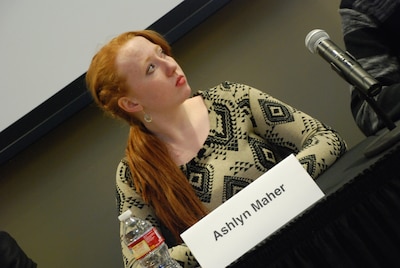
Several students noted that while their activism started with high-profile protests—and while those protests are what captured the attention of the media and community—they’ve continued to stay involved in the issues they care about in a variety of ways. These include testifying before the legislature, holding in-school conversations about topics like race, and meeting with school board and state officials to air their concerns.
Ashlyn Maher from Jefferson County talked about how students in Jefferson County are remaining organized:
Audience member Roshan Bliss commented that adults’ efforts to include students’ voices can’t be purely symbolic. He said organizations need to avoid creating a “kids’ table,” where students’ opinions are expressed and then ignored. Several panelists agreed with Bliss.
Many adult allies forced to toe the line
While adult panelists as well as audience members roundly praised the student panelists at the Rising Up event, there was a sense that some adults—school staff in particular—had to stifle their support last fall.
“We had a lot of tacit support from our school and district administration because legally they weren’t allowed to support us,” said Boulder’s Rachel Perley.
“I was sitting down talking to my newspaper advisor earlier today…and she was saying, ‘OK, I can say it now…just how proud I am of everything you guys did and how well put together it was,” Perley said.
Bar set too high for student protesters?
While student protesters certainly gained support from many adults in their respective communities last fall, some observers raised questions about whether all participants were well-informed about the issues and whether some were treating the protests simply as an opportunity to skip class.
Kirshner addressed this criticism during the panel discussion. Connections to protests of the past
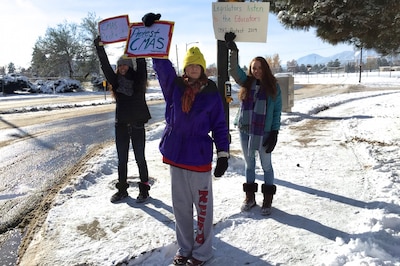
Both students and adults drew connections to protests of the past. CDE’s Asp said it was an odd experience for him, as a former student activist from the 1960s, to be on the receiving end of protests. The University of Colorado’s Kirshner said that there is a rich history of activism in Colorado, including groups such as Padres y Jovenes Unidos.
Senior Cody Limber mentioned getting an email from John Tinker, a former Des Moines high school student who protested the Vietnam War and ultimately sued the school district for impinging on his freedom of expression.
Full audio recording provided by the University of Colorado Denver:


